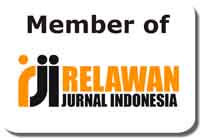Teachers’ Beliefs and Practices Towards Language Assessment in an Indonesian Islamic University
Abstract
Keywords
Full Text:
PDFReferences
Azis, A. (2012). Teachers’ conceptions and use of assessment in student learning. Indonesian Journal of Applied Linguistics, 2(1), 40–51. https://doi.org/10.17509/ijal.v2i1.72
Azis, A. (2015). Conceptions and practices of assessment: A case of teachers representing improvement conception. TEFLIN Journal, 26(2), 129–154. https://doi.org/http://dx.doi.org/10.15639/teflinjournal.v26i2/129-154
Bliem, C. L., & Davinroy, K. H. (1997). Teachers’ beliefs about assessment and instruction in literacy. Education and Information Studies (Vol. 1522). Los Angeles, CA.
Braun, V., & Clarke, V. (2016). Thematic analysis. In H. Cooper (Ed.), APA handbook of research method in Psychology (pp. 57–71). USA: American Psychological Association.
Brown, G. T. L. (2004). Teachers’ conceptions of assessment: Implications for policy and professional development. Assessment in Education: Principles, Policy & Practice, 11(3), 301–318. https://doi.org/10.1080/0969594042000304609
Burden, P. R., & Byrd, D. M. (2010). Methods for effective teaching: Meeting the needs of all students (5th ed.). The United States of America: Pearson Education Limited.
Ezzy, D. (2002). Qualitative analysis: Practice and innovation. Crows Nest, NSW: Allen & Unwin.
Finch, A. (2002). Authentic assessment: Implications for EFL performance testing in Korea. Secondary Education Research, 49, 89–122.
Gerring, J. (2007). Case study research: Principles and practices. New York: Cambridge University Press.
Inayah, N., Komariah, E., & Nasir, A. (2019). The practice of authentic assessment in an EFL speaking classroom. Studies in English Language and Education, 6(1), 152–162.
Muñoz, A. P., Palacio, M., & Escobar, L. (2012). Teachers’ beliefs about assessment in an EFL context in Colombia. Profile, 14(1), 143–158.
Pajares, M. F. (1992). Teachers’ beliefs and Educational research: Cleaning up a messy construct. Review of Educational Research, 62(3), 307–332. https://doi.org/10.3102/00346543062003307
Popham, W. J. (2017). Classroom assessment: What teachers need to know (8th Ed.). Los Angeles, CA: Pearson Education, Inc.
Pratiwi, N. P. W., Dewi, N. L. P. E. S., & Paramartha, A. A. G. Y. (2019). The reflection of HOTS in EFL teachers’ cummative assessment. Journal of Educational Research and Evaluation, 3(3), 127–133. https://doi.org/https://doi.org/10.23887/jere.v3i3.21853
Puad, L. M. A. Z., & Ashton, K. (2021). Teachers’ views on classroom-based assessment: An exploratory study at an Islamic boarding school in Indonesia. Asia Pacific Journal of Education, 41(2), 253–265. https://doi.org/10.1080/02188791.2020.1761775
Punch, K. F. (2005). Introduction to social research: Quantitative and qualitative approaches (2nd ed.). London: Sage Publications Ltd.
Qadi, A. (2021). An exploratory study of EFL teachers’ assessment conceptions at a Saudi university. Arab World English Journal (AWEJ), 12(3), 464–485. https://doi.org/http://dx.doi.org/10.2139/ssrn.3952970
Saad, M. R. B. M., Sardareh, S. A., & Ambarwati, E. K. (2013). Iranian secondary school EFL teachers’ assessment beliefs and roles. Life Science Journal, 10(3), 1638–1647. https://doi.org/10.1190/segam2013-0137.1
Shepard, L. A. (2000). The role of assessment in a learning culture. Educational Researcher, 29(7), 4–14. https://doi.org/10.2307/1176145
Shohamy, E., Inbar-Lourie, O., & Poehner, M. E. (2008). Investigating assessment perceptions and practices in the advances foreign language classroom (Report No. 1108). University Park, PA.
Stiggins, R. J. (2002). Assessment crisis: The absence of assessment for learning. Phi Delta Kappan, 83(10), 758–765. https://doi.org/https://doi.org/10.1177/003172170208301010
Tara, M. (2005). Assessment -summative and formative- some theoretical reflections. British Journal of Educational Studies, 53(4), 466–478. https://doi.org/https://doi.org/10.1111/j.1467-8527.2005.00307.x
Wang, L., Lee, I., & Park, M. (2020). Chinese university EFL teachers’ beliefs and practices of classroom writing assessment. Studies in Educational Evaluation, 66(September), 1–11. https://doi.org/10.1016/j.stueduc.2020.100890
Widiastuti, I. A. M. S., Mukminatien, N., Prayogo, J. A., & Irawati, E. (2020). Dissonances between teachers’ beliefs and practices of formative assessment in EFL classes. International Journal of Instruction, 13(1), 71–84. https://doi.org/10.29333/iji.2020.1315a
Yin, R. K. (2003). Case study research: Design and methods. Applied Social Research Methods Series, Vol.5. (3rd Ed.). Thousand Oaks, London: SAGE Publications. https://doi.org/10.1300/J145v03n03_07
Yu, S., & Lee, I. (2014). An analysis of Chinese EFL students ’ use of first and second language in peer feedback of L2 writing. System, 47(December), 28–38. https://doi.org/10.1016/j.system.2014.08.007
DOI: http://dx.doi.org/10.31332/lkw.v0i0.4475
Copyright (c) 2022 Muhammad Nur Akbar Rasyid

This work is licensed under a Creative Commons Attribution-ShareAlike 4.0 International License.
Publisher:
UPT Pengembangan Bahasa, IAIN Kendari
Jln. Sultan Qaimuddin No. 17 Baruga, Kota Kendari, Sulawesi Tenggara
Website: upb.iainkendari.ac.id
Email: [email protected]


















